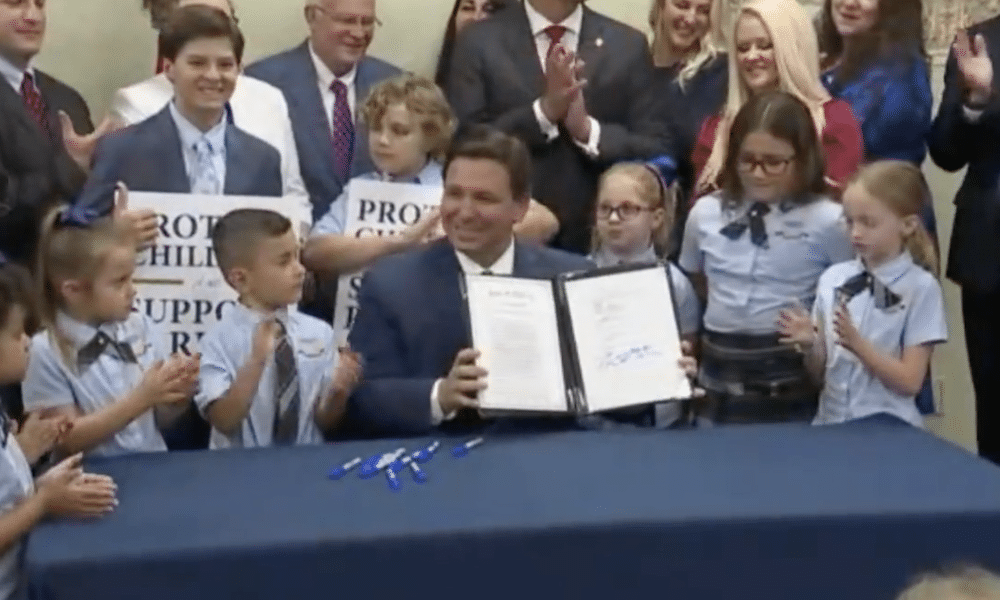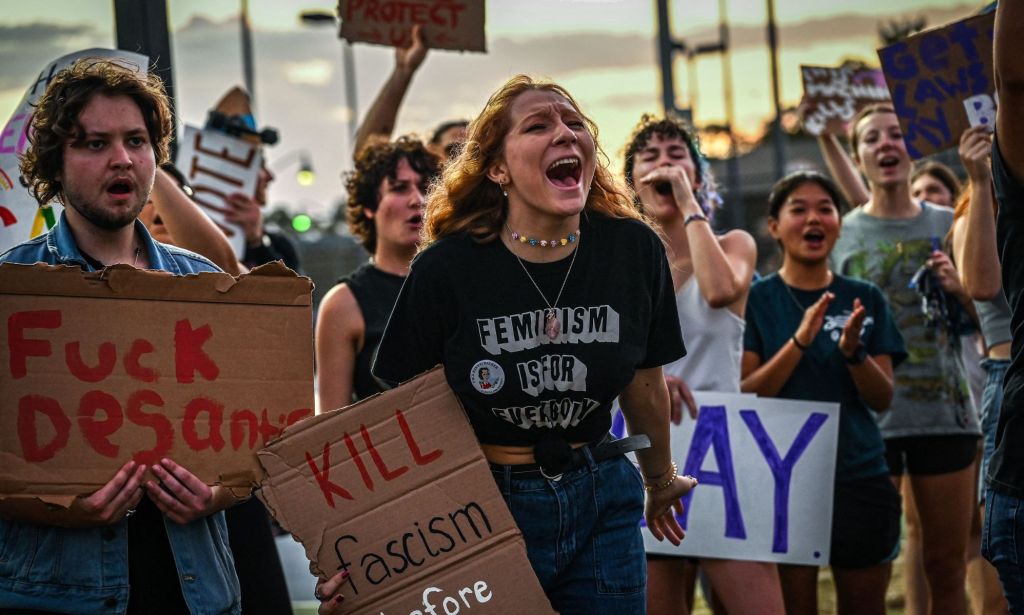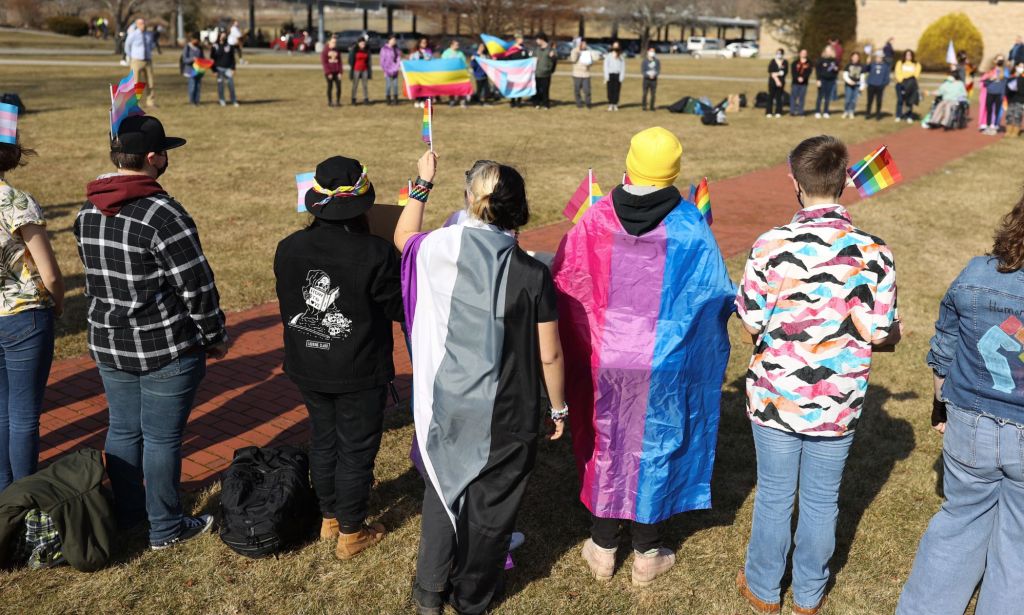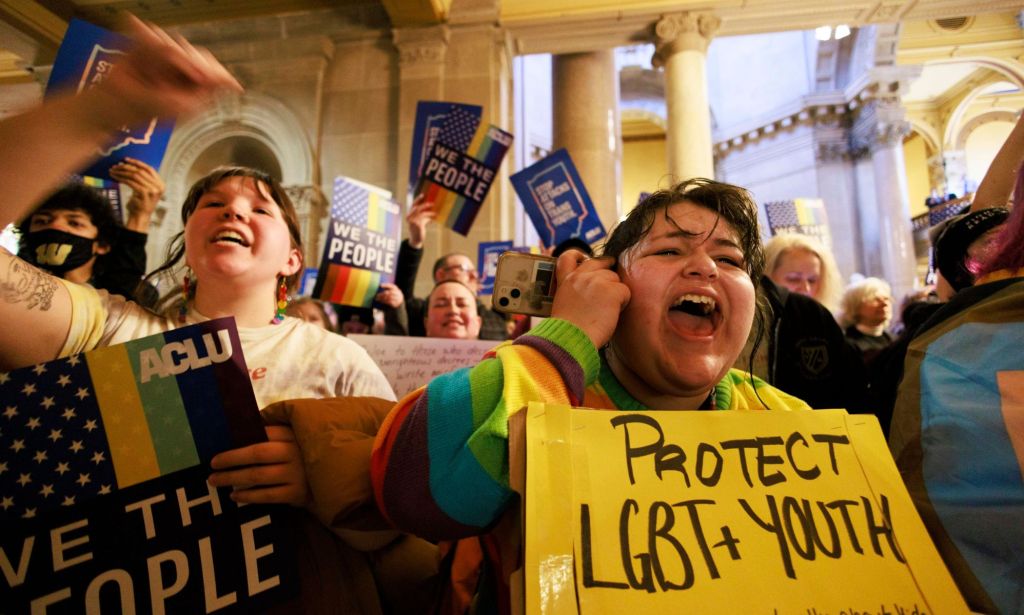Don’t Say Gay, one year on: Florida fears hateful law could remain in place for decades

Ron DeSantis wants to expand Don’t Say Gay. (Getty)
A year after Florida’s Don’t Say Gay bill become law, activists fear it could be decades before it’s lifted.
On 28 March, 2022, Ron DeSantis sat down among a group of blissfully unaware children to sign HB 1557 into law – a measure which would ban LGBTQ+ lives from their classrooms.
He said the bill would mean “parents can send their kids to school to get an education, not an indoctrination”. But a year on, the community is in no doubt that the intention was and remains simple. The bill was designed to terrorise LGBTQ+ people.
Equality Florida’s press secretary Brandon Wolf says it wasn’t a “complete surprise” to see a bill like ‘Don’t Say Gay’ introduced in Florida. Republicans had been going after LGBTQ+ rights with increasing fervour, targeting young trans people’s rights especially.
“The vehicle that the legislature – Ron DeSantis and his allies – chose was a little surprising because it was not what we had been preparing for around [trans] healthcare, and it was just so boldly, brazenly bigoted in a way they hadn’t yet been willing to be,” Wolf tells PinkNews.

“The right-wing in this country, especially in Florida, had focused their energies on the transgender community along as a way of trying to divide and conquer LGBTQ people, as a way of using trans folks as a wedge issue in politics, and the fact they broadened their scope in a dramatic, sufficient way to encompass the entire LGBTQ community did catch some people by surprise.”
The law, which took effect in July, bans instruction about sexual orientation and gender identity “in kindergarten through grade three” or “in a manner that is not age appropriate” for students in “accordance with state standards”.
In practice, its impact goes much further.
As the bill went into effect on 1 July, reports flooded in of teachers being told not to wear rainbows, to avoid mentioning their same gender spouses and to remove safe-space stickers from classes.
Schools pulled LGBTQ+ books from shelves and cancelled student-run plays with queer themes, while over half (56 parents) of LGBTQ+ parents considered moving out of state and moving their kids to a different school (11 per cent) in response to Don’t Say Gay, according to a survey by UCLA School of Law’s Williams Institute.

Scott Galvin, executive director of Safe Schools South Florida, recalls how he and other advocates raised concerns that Don’t Say Gay would “just scare teachers and administrators” out of talking about any and all LGBTQ+ issues over fears they would get sued or lose their jobs.
“The school systems in Dade and Broward [counties] have blocked our LGBTQ+ groups from interacting with their schools,” he says. “It’s most surprising in Broward because that’s ‘the most democratic county’ in the entire state, but the fear everybody has is real.
“They are doubling down… We’re not allowed to go into schools and talk to the GSA [Gay Straight Alliance]. In fact, many GSAs are changing their name to get rid of the word ‘gay’ or anything similar.”
Galvin thinks things will continue to “be really rough” for Florida’s queer community as Republicans increasingly target LGBTQ+ people.
DeSantis is currently pushing to expand Don’t Say Gay to cover all grades, with a board vote due next month and is all-but guaranteed to proceed.
In March, Florida representative Stan McClain proposed a bill that would limit students from discussing gender, HIV, sexuality and periods in school.

“Even within the LGBT community, many are still having a hard time wrapping their heads around this new reality,” Galvin adds.
“‘Don’t Say Gay’ is not going away next week. It’s going to be the law of Florida for 20 years because we have such a conservative majority so locked in place.”
After Florida’s ‘Don’t Say Gay’ bill passed, anti-LGBTQ+ hate spread across the nation and online
After Don’t Say Gay, attacks on LGBTQ-inclusive education have spread beyond Florida.
Copycat bills have cropped up in more than a dozen states, and in October, house representative Mike Johnson of Louisiana and 32 other Republicans introduced what was described as a national Don’t Say Gay bill.
More recently, in February, Republican president hopeful Nikki Haley said the Florida law doesn’t go far enough.
Rhetoric and legislation like this has coincided with a marked increase in hate against the LGBTQ+ community.
On 28 March, the day DeSantis signed the bill, there was a marked increase in the use of the “OKGroomer” hashtag online, according to a report by the Human Rights Campaign.
As well as this, tweets mentioning the LGBTQ+ community alongside such slurs as “groomer”, “paedophile” and “predator” surged in the month after its passage.

Aaron Ridings, chief of staff and deputy executive director for public policy and research at GLSEN, says the law represents an “attack not only on young people in schools but also on the LGBTQ+ communities as a whole”.
“The goal of so many of these really discriminatory, harmful bills is to let racism, homophobia, transphobia, sexism and other forms of systemic oppression run wild in our schools,” Ridings tells PinkNews.
“I think we’re seeing a lot of folks who are fed up with it. We saw that in Florida with the young people who organised and marched out of their schools, all the families who showed up at the state legislature – not only in Florida but across the country.”
Riding says it’s important to reflect on the seven states – Illinois, New Jersey, Connecticut, Colorado, Nevada, California and Oregon – “moving in the right direction” with legislation that explicitly requires LGBTQ+ inclusion in state curricular standards.
For now, at least, the fight against Don’t Say Gay continues. But with the 2024 presidential election in sight – and Ron DeSantis widely expected to run against Donald Trump for the Republican nomination – that battle seems likely to be a long one.

